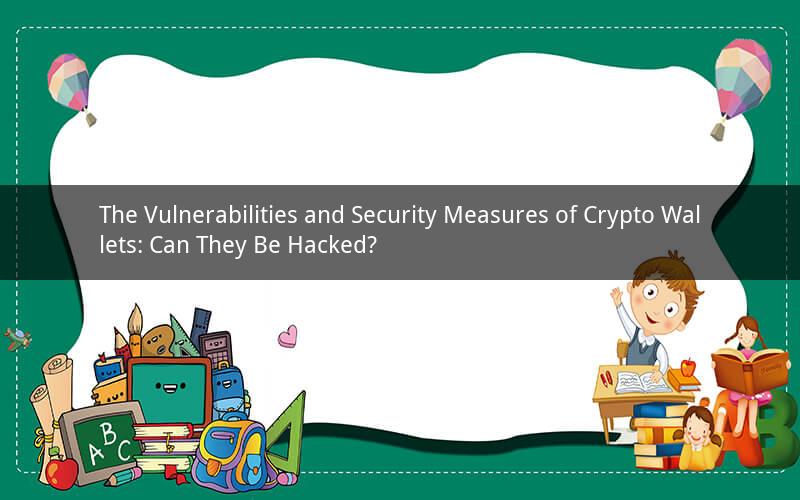
Introduction:
As the cryptocurrency market continues to grow, so does the importance of securing digital assets. One of the most crucial components of this security is the crypto wallet. However, concerns arise regarding the possibility of these wallets being hacked. In this article, we will explore the vulnerabilities and security measures of crypto wallets, while also addressing the question: Can crypto wallets be hacked?
1. Understanding Crypto Wallets:
A crypto wallet is a digital tool used to store, send, and receive cryptocurrencies. It can be categorized into two types: hot wallets and cold wallets. Hot wallets are connected to the internet and can be accessed remotely, while cold wallets are offline and provide a higher level of security.
1.1 Hot Wallets:
Hot wallets are convenient for daily transactions, but they are more susceptible to hacking. These wallets can be in the form of mobile applications, web-based platforms, or desktop software. They store private keys, which are necessary for accessing and controlling cryptocurrencies.
1.2 Cold Wallets:
Cold wallets, on the other hand, are considered more secure. They store private keys offline, making them less vulnerable to online threats. Cold wallets can be hardware wallets, paper wallets, or software wallets designed for offline use.
2. Vulnerabilities of Crypto Wallets:
Despite the security measures implemented, crypto wallets can still be prone to hacking. Here are some common vulnerabilities:
2.1 Weak Passwords:
One of the most common reasons for wallet breaches is weak passwords. Users often choose easy-to-guess passwords, making it easier for hackers to gain unauthorized access.
2.2 Phishing Attacks:
Phishing attacks involve sending fraudulent emails or messages that trick users into providing their private keys or login credentials. Once obtained, hackers can gain control over the wallet and its contents.
2.3 Malware:
Malware, such as viruses or Trojans, can infect a user's device and steal private keys or login credentials. This can occur through malicious software or by visiting compromised websites.
2.4 Social Engineering:
Social engineering involves manipulating individuals into revealing sensitive information. Hackers may exploit human vulnerabilities to gain access to crypto wallets.
3. Security Measures to Protect Crypto Wallets:
To mitigate the risks of hacking, several security measures can be implemented:
3.1 Strong Passwords:
Using strong and unique passwords can significantly reduce the likelihood of a successful hack. Passwords should be long, complex, and not easily guessable.
3.2 Two-Factor Authentication (2FA):
Enabling 2FA adds an extra layer of security by requiring a second form of verification, such as a unique code sent to a user's phone or email.
3.3 Regular Updates:
Keeping crypto wallets up to date with the latest software versions ensures that any vulnerabilities are patched, reducing the risk of hacking.
3.4 Cold Wallets:
Utilizing cold wallets for storing significant amounts of cryptocurrencies can minimize the risk of online attacks. Hardware wallets, in particular, offer robust security features.
3.5 Backup and Recovery:
Creating backups of private keys and recovery phrases ensures that users can regain access to their wallets in case of loss or compromise.
4. Can Crypto Wallets Be Hacked?
The answer to this question is yes, crypto wallets can be hacked. However, the likelihood of a successful hack depends on various factors, including the security measures implemented and the actions of the wallet owner. By understanding the vulnerabilities and taking appropriate precautions, users can significantly reduce the risk of their wallets being hacked.
5. Questions and Answers:
Q1: Can a mobile crypto wallet be hacked?
A1: Yes, mobile crypto wallets can be hacked if they are not properly secured. It is essential to use strong passwords, enable 2FA, and keep the wallet software updated to minimize the risk.
Q2: Are paper wallets secure from hacking?
A2: Paper wallets are generally considered secure as they are offline. However, if the physical paper containing the private keys is lost, stolen, or damaged, the funds can be lost as well.
Q3: Can a hardware wallet be hacked?
A3: While hardware wallets are generally more secure than software wallets, they are not immune to hacking. However, the chances of a successful attack are significantly lower due to their physical nature and built-in security features.
Q4: Is it possible to hack a crypto wallet through a phishing attack?
A4: Yes, phishing attacks can be used to trick users into revealing their private keys or login credentials, allowing hackers to gain unauthorized access to their wallets.
Q5: How can I protect my crypto wallet from hacking?
A5: To protect your crypto wallet from hacking, use strong passwords, enable 2FA, keep the wallet software updated, use cold wallets for storing significant amounts, and be cautious of phishing attacks and social engineering attempts.
Conclusion:
While the possibility of crypto wallets being hacked exists, implementing appropriate security measures can significantly reduce the risk. By understanding the vulnerabilities and taking proactive steps to protect their wallets, users can ensure the safety of their digital assets.